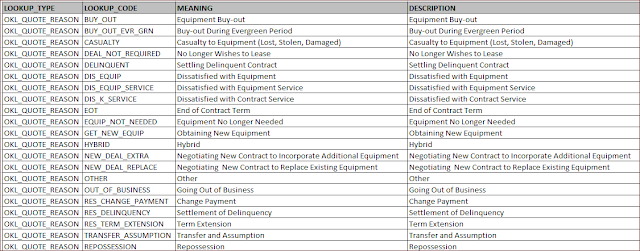SELECT frt.responsibility_name, frg.request_group_name,
frgu.request_unit_type,frgu.request_unit_id,
fcpt.user_concurrent_program_name
FROM fnd_Responsibility fr, fnd_responsibility_tl frt,
fnd_request_groups frg, fnd_request_group_units frgu,
fnd_concurrent_programs_tl fcpt
WHERE frt.responsibility_id = fr.responsibility_id
AND frg.request_group_id = fr.request_group_id
AND frgu.request_group_id = frg.request_group_id
AND fcpt.concurrent_program_id = frgu.request_unit_id
AND frt.LANGUAGE = USERENV('LANG')
AND fcpt.LANGUAGE = USERENV('LANG')
AND fcpt.user_concurrent_program_name = :conc_prg_name
ORDER BY 1,2,3,4
frgu.request_unit_type,frgu.request_unit_id,
fcpt.user_concurrent_program_name
FROM fnd_Responsibility fr, fnd_responsibility_tl frt,
fnd_request_groups frg, fnd_request_group_units frgu,
fnd_concurrent_programs_tl fcpt
WHERE frt.responsibility_id = fr.responsibility_id
AND frg.request_group_id = fr.request_group_id
AND frgu.request_group_id = frg.request_group_id
AND fcpt.concurrent_program_id = frgu.request_unit_id
AND frt.LANGUAGE = USERENV('LANG')
AND fcpt.LANGUAGE = USERENV('LANG')
AND fcpt.user_concurrent_program_name = :conc_prg_name
ORDER BY 1,2,3,4


